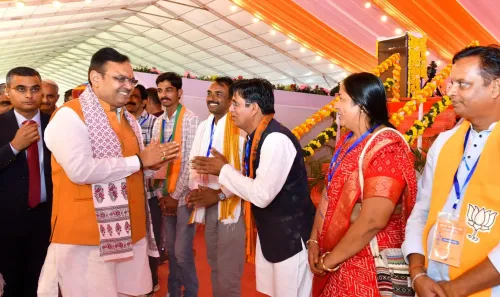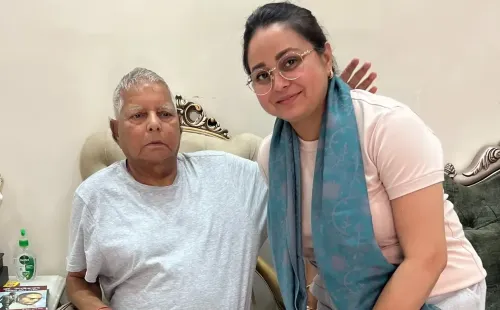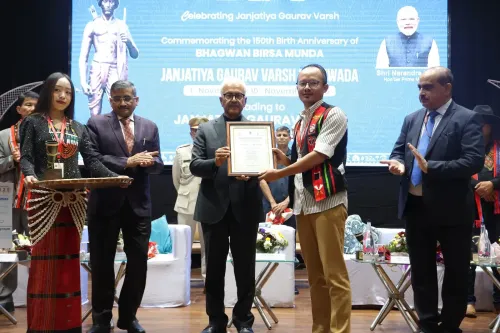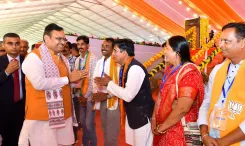How Are Women-Centric Schemes in Bihar Influencing Elections?
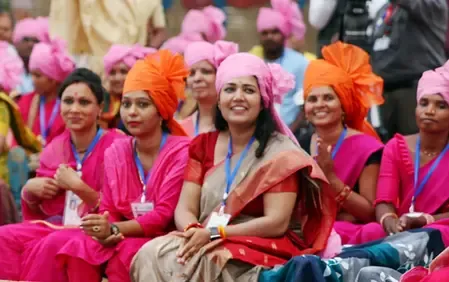
Synopsis
Key Takeaways
- Women-centric schemes are pivotal in recent state elections.
- These initiatives empower women to shape their futures independently.
- Political parties leverage these schemes to influence voter behavior.
- Local influencers play a crucial role in the success of these initiatives.
- Such programs lead to both immediate electoral gains and long-term societal changes.
New Delhi, Nov 15 (NationPress) In the latest state elections, ranging from Bihar to Madhya Pradesh and Maharashtra, political parties have introduced women-focused welfare initiatives aimed at empowering women to define their futures independently. These schemes also serve to counteract Opposition arguments and sway voter behavior.
Women benefit from various Union government initiatives such as the Jan Dhan Yojana, Lakhpati Didi, Mudra Yojana, Drone Didi campaign, Bima Sakhi campaign, and the Bank Didi program, among others.
The National Commission for Women highlights that 40 departments within the National Democratic Alliance (NDA) government, led by Prime Minister Narendra Modi, are offering numerous targeted women-centric schemes.
State governments have implemented similar initiatives, often launching their own programs or broadening existing ones.
The recent Assembly election results in Bihar are attributed to the NDA's policies that focus on women empowerment.
Experts have noted that schemes from the Nitish Kumar-led Bihar government, such as the Mukhyamantri Mahila Rojgar Yojana, which enables women to start businesses, and the Mukhyamantri Balika Cycle Yojana, along with scholarship and uniform schemes for girls from economically weaker backgrounds, played a significant role.
Union Agriculture Minister Shivraj Singh Chouhan, during his tenure as Chief Minister of Madhya Pradesh, was affectionately called 'Mama' by children for his efforts in supporting their mothers.
State-specific initiatives include the Ladli Laxmi Yojana providing financial support for the birth of a girl child, Kanyadaan Yojana for mass marriages of economically disadvantaged girls, and the Ladli Behna Yojana, which offers monthly assistance for young women from underprivileged backgrounds.
These programs have notably improved the living conditions of women and children in Madhya Pradesh, contributing to Chouhan's popularity.
Currently, he oversees initiatives like the Mahila Kisan Sashaktikaran Pariyojana, which aims to boost the productivity and income of women farmers, and the Rashtriya Mahila Kisan Yojana, encouraging women in leadership roles within agriculture.
In Maharashtra, the BJP-led government's Mukhyamantri Majhi Ladki Bahin Yojana stands out for providing monthly financial assistance to women, a feature that political parties can highlight during their campaigns.
This approach illustrates how the branding and regular distribution of benefits can enhance political impact.
Programs labeled as 'Ladli Behna' or 'Ladki Bahin' achieve more than just financial transfers; they establish a recurring engagement through beneficiary meetings, card distributions, and public inaugurations that foster interaction between party members and voters.
Such interactions strengthen local party networks and make the advantages of incumbency evident.
In Jharkhand and other states, officials have pointed to the targeted direct benefit transfers and welfare initiatives aimed at mothers and low-income women as crucial components of the incumbents' outreach efforts.
Beyond immediate electoral impacts, women-centric schemes also create organizational advantages.
These initiatives facilitate door-to-door canvassing, allow for strategic timing of fund disbursements in line with electoral calendars, and cultivate local influencers, such as self-help group leaders and community organizers, who serve as liaisons between the government and voters.
Reports indicate that the incumbent government often sees favorable outcomes from these target groups, enhancing voter turnout, particularly in semi-urban and rural areas where personal connections matter.
As election schedules progress, it is anticipated that the emphasis on women-centric appeals will intensify, with new promises for cash transfers, expansions of maternity and nutrition programs, and more targeted branding aimed at women voters.
Reports from West Bengal suggest that the results from the Bihar elections may inspire the ruling Trinamool Congress to increase funding for its widely-supported 'Lakshmir Bhandar' initiative, which provides financial aid to economically disadvantaged women.
Notably, it was reported that Chief Minister Mamata Banerjee had previously raised the funding before the upcoming 2024 Lok Sabha elections.
Assembly elections in West Bengal are projected for the first quarter of 2026.

